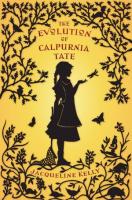
One of the most interesting species available for study is the tween. Although it is not as much fun to actually be this age, the lives of these creatures are nevertheless instructive. And so it goes for Calpurnia Tate, who is nearly twelve years old in 1899. She's busy contemplating both the imminence of the new century and the infinitely changing landscape of her south Texas home. Although her family is well off, and Calpurnia is the only girl among seven children (which means a coveted private bedroom) readers get the feeling that something is missing. When Calpurnia gets up the courage to ask her mysterious grandfather a question, that something missing is found. Although the rest of the family considers the elder Mr. Tate to be a scary individual, Calpurnia finds out that he can be very kind indeed - especially if you ask him about his favorite subject. Grandfather Tate is a naturalist, a founding member of the National Geographic Society, and has carried on a correspondence with the great man himself: Charles Darwin.
As Calpurnia discovers her own passion for observing the natural world, she and Grandfather rather randomly come across a strange form of vetch while touring the Tate property. Grandfather is especially excited, as it might be the holy grail of his life's study... a new species! But while he and Calpurnia are tramping around the fields, the women of the house are plotting to turn Calpurnia from a caterpillar into a butterfly. An accomplished candidate for a debut year does not start her young womanhood up to her elbows in mud and debris, helping her grandfather distill pecan liquor, bending over a microscope, or carrying on a scientific correspondence with the Smithsonian! Determined to convert the budding scientist into a delicate blossom of Southern womanhood, Calpurnia's mother and the house servant Viola take her to task, forcing endless sock knitting and pie baking upon her.
This book is a beautiful exploration of the constraints placed on young women in the early 1900s. Calpurnia may be flunking deportment in school, but Grandfather is the only adult concerned that she has no access to scientific apparatus in school (much less a proper physics curriculum). Calpurnia comes to slowly realize that nobody in her family beyond her grandfather believes that she could go to university; the dream of which becomes her cherished wish even while she watches her oldest brother wastefully reject his chance at higher education in favor of studying attractive young ladies.
Calpurnia's story reads like a guidebook for discovering your own passion, if you happen to be a tweenager. For adults, it's an amazing example of the inspiration you can provide in a child's formative experiences. More than that, The Evolution of Calpurnia Tate reminds us that despite generational mutations the greatest human trait remains staying true to one's own self.


